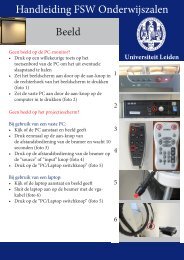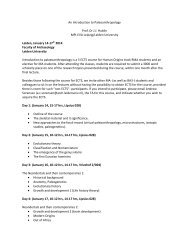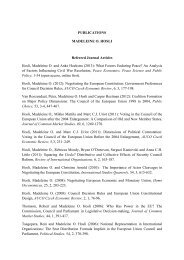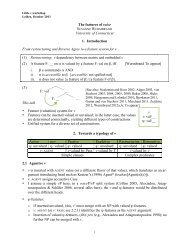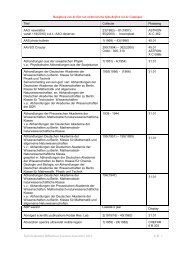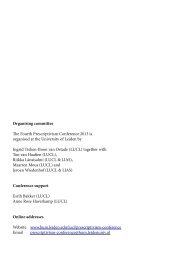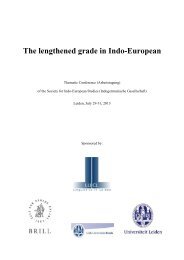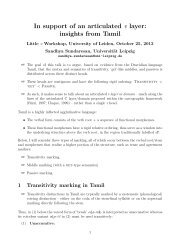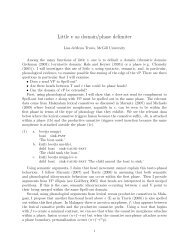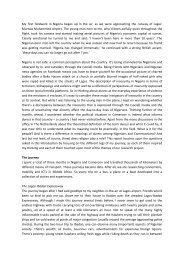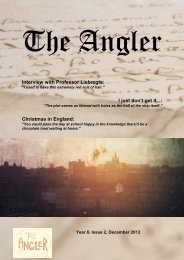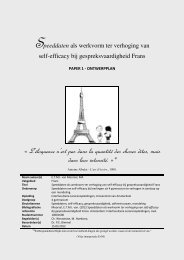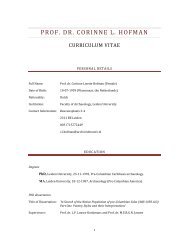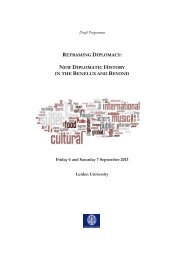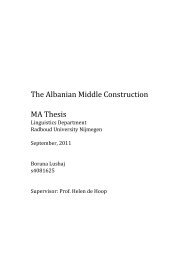Institute for History Annual Report 2010 - O - Universiteit Leiden
Institute for History Annual Report 2010 - O - Universiteit Leiden
Institute for History Annual Report 2010 - O - Universiteit Leiden
You also want an ePaper? Increase the reach of your titles
YUMPU automatically turns print PDFs into web optimized ePapers that Google loves.
done by early modern people. Modern scholars<br />
have trans<strong>for</strong>med the world of custom, community<br />
and tradition that Nora so confidently<br />
identified as the settings of ‘milieux de mémoire’,<br />
into a much more complex and dynamic phenomenon.<br />
They have emphasised how early modern<br />
culture integrated and domesticated change on<br />
the one hand, while at the same time innovating<br />
much more radically than itself was willing to<br />
admit. This project will attempt to bridge the gap<br />
between the macro-historical narratives of the<br />
memory theorists, and the evidence <strong>for</strong> early<br />
modern memory practices. The aims are both to<br />
improve and rethink the macro-historical narratives,<br />
and because it might help early modernists<br />
themselves to think more systematically about<br />
continuity and change in the shape and uses of<br />
memory in this period. To achieve this aim, this<br />
project will pursue two routes. The first is a<br />
comparison over time, through a study of modern<br />
and early modern memory practices, with a focus<br />
on those related to civil wars. The second focuses<br />
on identifying and explaining changes in memory<br />
by departing from the early modern period. The<br />
idea here is to exploring a number distinctive<br />
features of the ways in which early modern people<br />
engaged with the past, and the impact of these on<br />
memory practices, be<strong>for</strong>e examining the extent to<br />
which, and the reasons why, these trans<strong>for</strong>med<br />
over time.<br />
Families, Corporations and Institutions.<br />
The Role of Trust in the Formation of<br />
Urban Communities in Western Europe,<br />
<strong>Institute</strong> <strong>for</strong> <strong>History</strong><br />
51<br />
1250-1500 (NWO Rubicon, Birkbeck,<br />
University of London)<br />
Arie van Steensel<br />
In the rapidly growing cities of the late Middle<br />
Ages new <strong>for</strong>ms of trust emerged that gave social<br />
cohesion to the urban community. Civic<br />
corporations and public institutions strengthened<br />
the processes of social integration and community<br />
building in the medieval city. This project aims to<br />
reveal the social mechanisms that underlay these<br />
new, extra-familial solidarities, as well as to<br />
determine the factors that facilitated their<br />
<strong>for</strong>mation. It does so by comparing the<br />
developments in cities with different political and<br />
socio-economic profiles from Italy, the Low<br />
Countries and England. This comparative research<br />
will contribute to our knowledge about the<br />
structural factors that explain the relation between<br />
the evolution of urban communities and the<br />
provision of public services. It will contribute to<br />
the interdisciplinary debate about the practice of<br />
trust and the role of institutionalisation and civil<br />
society in community building, drawing on<br />
sociological theory pertaining to trust and social<br />
networks. The research also enhances our<br />
understanding of the scope and organisation of<br />
public services in the medieval city. The central<br />
question is how the transition from personal to<br />
more general <strong>for</strong>ms of trust in corporations and<br />
institutions facilitated the process of urban<br />
community building in the period from 1250 to<br />
1500.<br />
Taste in Transition



